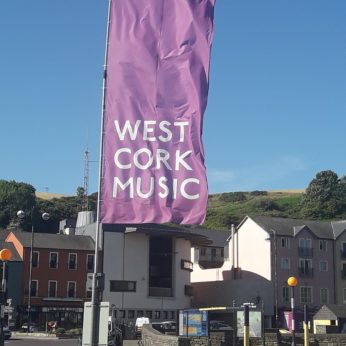Composer: Wolfgang Amadeus Mozart (b. 1756 - d. 1791)
Performance date: 04/07/2018
Venue: St. Brendan’s Church
Composition Year: 1777
Duration: 00:14:33
Recording Engineer: Ciaran Cullen, RTÉ
Instrumentation: vn, va, vc
Instrumentation Category:Small Mixed Ensemble
Instrumentation Other: fl, vn, va, vc
Artists:
Fiona Kelly -
[flute]
Liana Gourdjia -
[violin]
Piotr Szumiet -
[Viola]
Andreas Brantelid -
[cello]

40. COFFEE CONCERT – ST BRENDAN’S CHURCH 11.00
Fiona Kelly [flute], Liana Gourdjia [violin], Piotr Szumiet [viola], Andreas Brantelid [cello]
Wolfgang Mozart [1756-1791]
Flute Quartet in D major K.285 [1777]
1. Allegro
2. Adagio
3. Rondeau: Allegretto
In 1777 Mozart made his first break for freedom from the stifling grip both of Salzburg’s domineering Archbishop Colloredo and his father, Leopold Mozart. The 21-year-old composer set off to seek his fortune accompanied by his mother. Their plan was simple; to travel through the courts of Germany hoping to induce some prince to offer him a permanent post. The family scraped together such money as was available to start the journey, and Wolfgang was to cover further travelling expenses through performances, teaching and commission fees. Their journey was to take them to Munich, Augsburg, Mannheim and finally Paris.
The D major Flute Quartet dates from Mozart’s extended stay in Mannheim in the winter of 1777, where he fell in love with Aloisia Weber, and upset all his family’s carefully laid plans. Suddenly Mozart began finding all sorts of excuses for not travelling on to Paris and, even worse, he prevaricated and procrastinated about completing the only valuable commission that he had won on the trip. This came from a Dutch music-lover and amateur flautist called De Jean, who was prepared to pay 200 florins for three flute concertos and four flute quartets. In the event Mozart only completed two concertos – one merely a transcription of his oboe concerto and two quartets – so, naturally, De Jean paid him less than half the fee. This news incensed Leopold, who was sending tirade after tirade from Salzburg, trying to beat some practical sense into his erring son: It depends upon nothing else but your common sense and your way of life whether you become an ordinary musician forgotten by the world, or a famous Kapellmeister of whom posterity will continue to read in books; whether, herded into captivity by some female, you die on a sack of straw in a room full of needy children; or whether you die fulfilled, with honour and reputation, esteemed by all the world, and with your family prospering.
Posterity might argue that De Jean should have been content with his slice of immortality, but a practical Dutchman was only going to pay for what he got. He was deceived neither by Mozart’s underhand arrangement nor by the lovesick composer’s wild promises that he would follow him to Paris with the rest of the commission completed. Mozart was also deceiving the Weber family by pretending to wealth and position that was, in fact, no better than their own. He dazzled them with his talent, which, as musicians themselves, they could immediately comprehend; his lack of both funds and influence took longer to sink in. Indeed within a year the self-assured Aloisia, by then the prima donna of Munich, rejected Mozart, who returned with his tail between his legs. It had been a disastrous trip for the Mozart family; his mother had died in Paris, and Leopold had to send him money for the return journey.
The D major quartet is a happy and tuneful work, full of vivacious high spirits. This belies Mozart’s famous complaint that he found the flute an unbearable instrument, which was clearly yet another excuse manufactured to explain to his father why he could not finish the commission. The slow movement is equally charming with the gently singing flute accompanied by the pizzicato strings. The hectic pace and the masterly facility of the final Rondeau bring the work to a joyful conclusion.
Francis Humphrys
Copyright © 2025 West Cork Music. All rights reserved.
Designed and developed by Matrix Internet